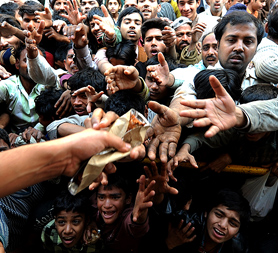Oxfam: food prices set to double by 2030
The price of staple foods, such as corn, is set to double in the next 20 years unless global leaders take action, Oxfam warns.

The aid charity named and shamed governments across the globe for having “failed policies” that perpetuate food shortages – including India, the EU and the United States.
US policy, for example, ensures that 15 per cent of the world’s corn is used to make fuel, Oxfam said, even at times of severe food crisis.
The amount of grain needed to fill a petrol tank of a 4×4 vehicle with biofuel could feed one person for a year – yet under EU targets, 10 per cent of transport fuel will be covered by biofuels by 2020.
However, the UN Food and Agriculture Organisation (FAO) pointed out that the US has ramped up its production of corn by three times in order to meet the demand for fuel.
Among all the devils, the neglect of agriculture by policy makers is the worst. The fact is that people take agriculture and food for granted and the producers are poor, with no voice. Abdolreza Abbassian, UN Food & Agriculture Organisation
Abdolreza Abbassian, economist at FAO told Channel 4 News: “What’s more worrying is the reduced production of other crops – to make way for the increase in corn. And environmentalists will ask questions about how it produces the corn – how much fertiliser is used and so on.”
Mr Abbassian said governments must adjust their policies to reflect the changing demands.
Mr Abbassin told Channel 4 News: “Among all the devils, the neglect of agriculture by policy makers is the worst. The fact is that people take agriculture and food for granted and the producers are poor, with no voice.
“The blame is not giving enough of a voice to the people on the front line – they wouldn’t do this to the banks or financial institutions who have a voice; or America’s ethanol industry, which has a voice.”
Oxfam said new policies must be agreed by leaders of the G20 to combat the fight against hunger, which is “now being reversed as demand outpaces food production”.
As a proportion of their income, Indian people pay the equivalent of £10 for a litre of milk and £6 for a kilo of rice. Oxfam
Average international food prices are set to climb by up to 180 per cent by 2030, the aid charity warned, with up to half of the increase due to the gathering pace of climate change.
Dwindling natural resources and a scramble for fertile land and water, are also helping to drive food prices up – with almost a billion people a day left hungry, Oxfam’s report Growing a Better Future found.
By 2050, Oxfam predicts the demand for food will climb by 70 per cent. Yet the average growth rate in agricultural yields has almost halved since 1990 and is set to set to slide further in the coming decade.
Oxfam’s chief executive Barbara Stocking said: “We are sleepwalking towards an avoidable age of crisis. One in seven people on the planet go hungry every day despite the fact that the world is capable of feeding everyone.
“The food system must be overhauled if we are to overcome the increasingly pressing challenges of climate change, spiralling food prices and the scarcity of land, water and energy. We much consign hunger to history.”
The world’s poorest people, who spend up to 80 per cent of their income on food, will suffer the most.
Many governments and companies will be resistant to change through habit, ideology or the pursuit of profit. It is up to us – to you and me – to persuade them by choosing food that’s produced fairly and sustainably. Archbishop Desmond Tutu
Between 1990 and 2005, the number of people going hungry rose by 65 million – yet over the same period, India doubled the size of its economy.
“Economic development excluded the rural poor, and welfare programmes failed to reach them,” Oxfam said. Today, one in four of the world’s hungry people live in India.
“Oxfam will expose the governments whose failed policies are propping up the broken food system and the powerful companies who benefit and lobby hard to maintain it,” the charity warned.
Earlier this year, the United Nations announced that world food prices had hit record highs, surpassing levels in 2008 when soaring prices sparked riots in many countries.
Land grabs and the decline of the small farmer
The expanse of land devoted to growing biofuel crops, such as corn and sugarcane, now eclipses the size of Italy – after doubling to 36m hectares between 2004 and 2008, according to the World Bank.
The rise in ‘land grabs’ has seen governments quietly hand over control of vast tracts of land into foreign hands, often at the expense of small farmers who don’t own the land, Christian Aid has warned.
Bramdean Asset Management, co-founded by Nicola Horlick, has invested in land in Brazil. “One of the great themes for investment managers at the moment is food and the production of food and farming. Because there’s a shortage, therefore prices are rising and that means you’re likely to make money as an investor,” she told Radio 4’s Today programme.
Ms Horlick argued that over time the move will help produce more food at cheaper prices. While investment has its benefits, Oxfam’s research found that the frenzy of investment in land in 2008 saw investors pick up more land than they could possibly use – with more than 60 per cent of the land targeted in Africa.
“The most comprehensive research to date suggest that 80 per cent of projects reported in the media are undeveloped and only 20 per cent had begun actual farming,” Oxfam’s report found.